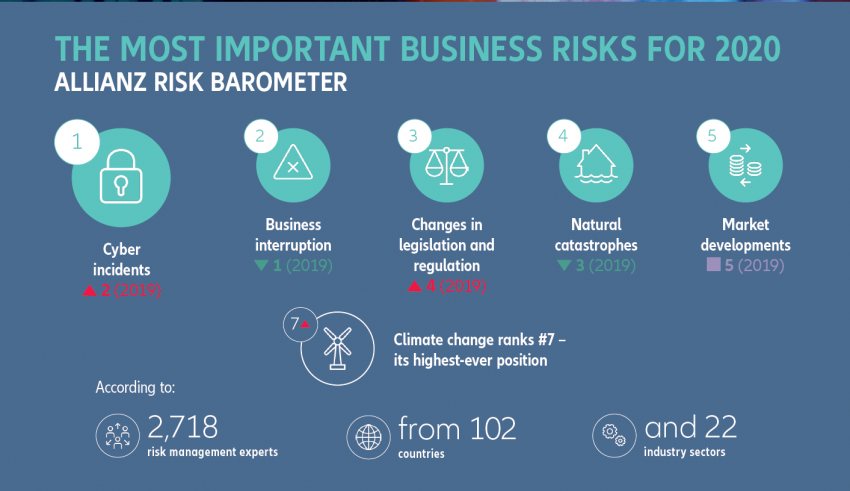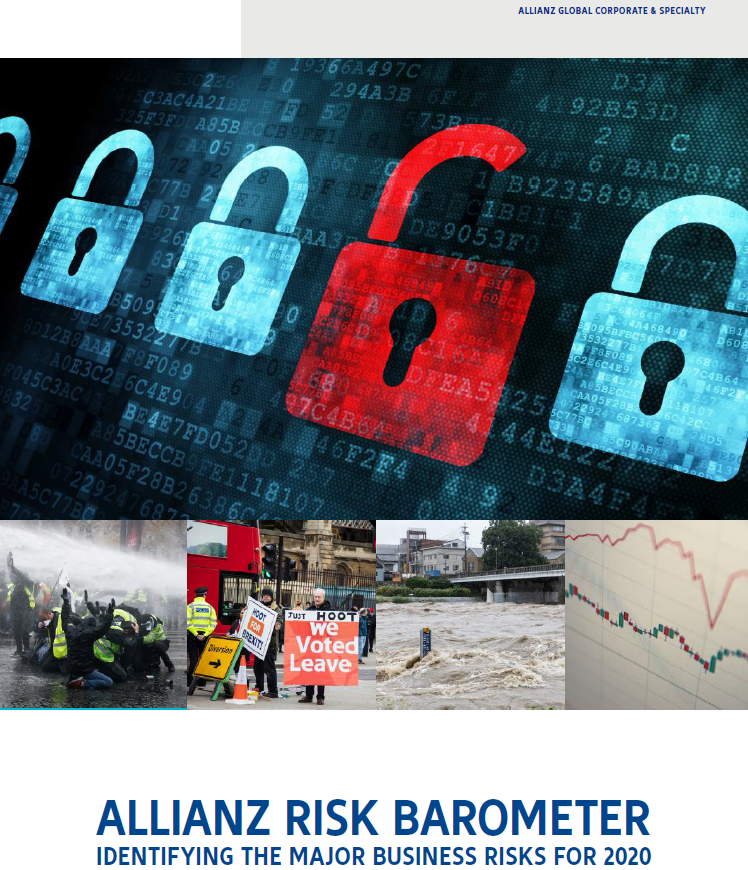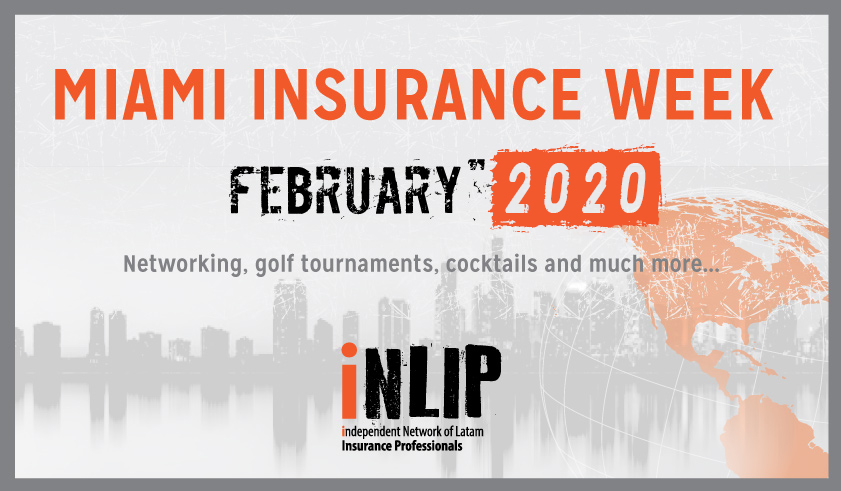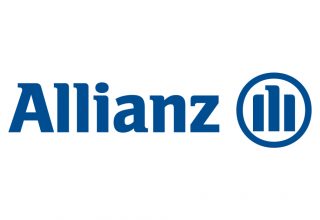
Allianz Risk Barometer 2020: Cyber top peril for companies globally for the first time
- 9th annual survey on top business risks attracts record participation of 2,700+ experts from over 100 countries
- Cyber incidents have become more damaging and expensive for companies – and often result in lawsuits and litigation after the event
- Business interruption ranks second, but remains a key challenge with digitalization and civil unrest creating new causes of disruption and loss of income
- Climate change rises to its highest-ever position – companies are most concerned about physical losses from extreme weather events but also fear consumer criticism and increasing regulatory and legal action.
For the first time ever, Cyber incidents (39% of responses) ranks as the most important business risk globally in the ninth Allianz Risk Barometer 2020, relegating perennial top peril Business interruption (BI) (37% of responses) to second place. Awareness of the cyber threat has grown rapidly in recent years, driven by companies’ increasing reliance on data and IT systems and a number of high-profile incidents. Seven years ago, it ranked only 15th with just 6% of responses.
Changes in legislation and regulation (#3 with 27%) and Climate change (#7 with 17%) are the biggest climbers globally underlining the US-China trade war, Brexit and global warming as increasing concerns for companies and nations. The annual survey on global business risks from Allianz Global Corporate & Specialty (AGCS) incorporates the views of a record 2,718 experts in over 100 countries including CEOs, risk managers, brokers and insurance experts.

“The Allianz Risk Barometer 2020 highlights that cyber risk and climate change are two significant challenges that companies need to watch closely in the new decade,” says Joachim Müller, CEO of AGCS. “Of course, there are many other damage and disruption scenarios to contend with, but if corporate boards and risk managers fail to address cyber and climate change risks this will likely have a critical impact on their companies’ operational performance, financial results and reputation with key stakeholders. Preparing and planning for cyber and climate change risks is both a matter of competitive advantage and business resilience in the era of digitalization and global warming.
South America: contingency planning
Although worldwide the main danger for companies are cyber attacks, South American companies are more concerned about Business Interruption (BI). First place in the Brazil (33%) and in Colombia (35%), this is risk that reflects the need for companies to think about prevention and contingency plans for the most diverse incidents. “BI can often just be the tip of the iceberg in terms of losses for a business. A Business Interruption claim can trigger many others, leading a company to unimaginable losses“, says Glaucia Smithson, CEO AGCS South America.
The importance of prevention and planning, as well as a close and open dialogue between a company and its insurer, are key to minimizing risks and losses. “Working closely with the client, we can provide an analysis of the company’s operation, assessing the risks they are exposed to and what we can do to mitigate or even eliminate them. At AGCS we work with an integrated global network of specialists who can design, together with the client, prevention models and contingency plans, and we also offer a very efficient claims process, which makes the difference when their operations are interrupted”, she adds.
Cyber risks continue to evolve
In addition to being the top risk globally, Cyber incidents is among the top three risks in many of the countries surveyed; in Austria, Belgium, France, India, South Africa, South Korea, Spain, Sweden, Switzerland, the UK and the US it also ranks as the top business risk. Businesses face the challenge of larger and more expensive data breaches, an increase in ransomware and spoofing incidents, as well as the prospect of privacy-driven fines or litigation after an event. A mega data breach ─ involving more than one million compromised records ─ now costs on average $42mn[1], up 8% year-on-year. “Incidents are becoming more damaging, increasingly targeting large companies with sophisticated attacks and hefty extortion demands. Five years ago, a typical ransomware demand would have been in the tens of thousands of dollars. Now they can be in the millions,” says Marek Stanislawski, Deputy Global Head of Cyber, AGCS.
Extortion demands are just one part of the picture: Companies can suffer major BI losses due to the unavailability of critical data, systems or technology, either through a technical glitch or cyber-attack. “Many incidents are the results of human error and can be mitigated by staff awareness trainings which are not yet a routine practice across companies,” says Stanislawski.
Business interruption – an undiminished threat with new causes
After seven years at the top, BI drops to the second position in the Allianz Risk Barometer. However, the trend for larger and more complex BI losses continues unabated. Causes are becoming ever more diverse, ranging from fire, explosion or natural catastrophes to digital supply chains or even political violence. “Digital supply chains and platforms today allow for full transparency and traceability of goods but a fire at a data center, a technical glitch or a hack could bring large BI losses for multiple companies that all rely and share the same system and which cannot switch back to manual processes,” says Raymond Hogendoorn, Global Head of Property and Engineering Claims at AGCS.
Companies are also increasingly exposed to the direct or indirect impact of protests, civil demonstrations or terrorist attacks. “Last year was very active in terms of popular mobilization in many places like Hong Kong, France, Chile, Bolivia and Colombia, resulting in damage to public and private properties and also a disruption in many businesses and even basic services to the population,” recalls Smithson.
Changes in legislation and regulation ranks third in the Allianz Risk Barometer, up from fourth in 2019. Tariffs, sanctions, Brexit and protectionism were cited as key concerns. Around 1,300 new trade barriers were implemented in 2019 alone. The US-China trade dispute has brought the US average tariff close to levels last seen in the 1970s. “Trade policy is becoming just another political tool for many different policy ends, such as economic diplomacy, geopolitical influence or environmental policy,” explains Ludovic Subran, Chief Economist of Allianz. “This activism is not restricted to the US: it has spread to Japan and South Korea, India and the EU.”
New regulatory challenges in the next decade will focus on environmental impact, de-carbonization and climate change. “EU sustainability regulation is nothing less than a game changer. The impact on corporates will be as wide-ranging as that of the new rules on accounting and data protection were in the past,” says Subran.
Climate change brings added risk complexity
Climate change rises to its highest-ever position of seventh in the Allianz Risk Barometer and is already in the top three business risks for the Asia-Pacific region overall, driven by risk management experts in countries and territories such as Australia, Hong Kong, India and Indonesia. An increase in physical losses is the exposure businesses fear most (49% of responses) as rising seas, drier droughts, fiercer storms and massive flooding pose threats to factories and other corporate assets, as well as transport and energy links that tie supply chains together. Further, businesses are concerned about operational impacts (37%), such as relocation of facilities, and potential market and regulatory impacts (35% and 33%). Companies may have to prepare for more litigation in future – climate change cases targeting ‘carbon majors’ have already been brought in 30 countries around the world, with most cases filed in the US.
“There is a growing awareness among companies that the negative effects of global warming above two degrees Celsius will have a dramatic impact,” says Chris Bonnet, Head of ESG Business Services at AGCS. “Failure to take action will trigger regulatory action and influence decisions from customers, shareholders and business partners. Ignoring climate risk is more costly than grappling with it. Therefore, every company has to define its role, stance and pace for its climate change transition – and risk managers need to play a key role in this process alongside other functions.”
More information on the findings of the Allianz Risk Barometer 2020 is available here:
[1] IBM Security, Ponemon, Cost Of A Data Breach Report 2019
Source: Allianz














